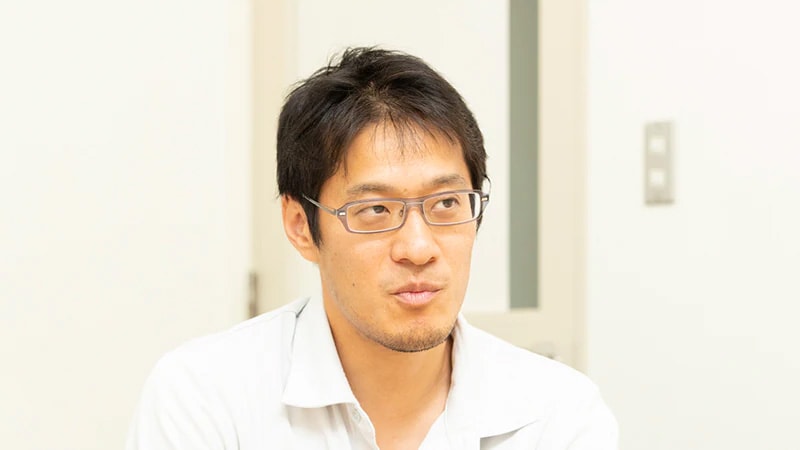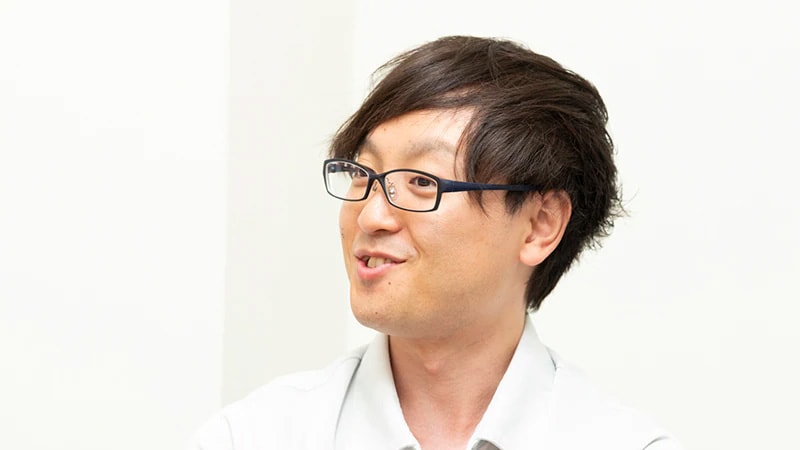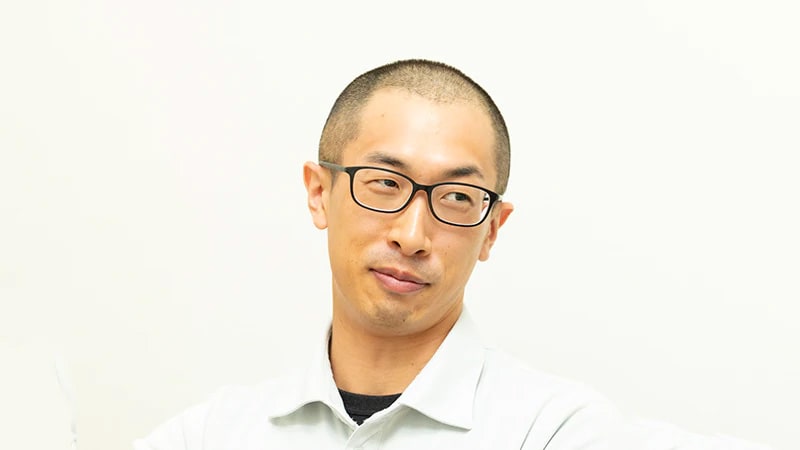Next Step


On the Frontline of Developing Technology Offering an Extraordinary Increase in Performance
High-performance analytical instruments lead science into the future. Shimadzu has taken the next step toward increasing the performance of mass spectrometers with the development of a quadrupole time-of-flight (Q-TOF) liquid chromatograph mass spectrometer.
Important Project
Since joining the company, Mukaibatake, Manager of the LCMS Group in the MS Business Unit has spent almost all his time developing liquid chromatograph mass spectrometers. Mukaibatake normally leads large-scale development projects and is highly thought of in the MS Business Unit.
His current team has expanded to be the largest ever in accordance with the company's expectations. He felt the pressure of developing a flagship model within a strict schedule. The development of the LCMS-9030 quadrupole time-of-flight (Q-TOF) mass spectrometer, released in June 2018, was a matter of pride for a mass spectrometer manufacturer.
To be on Par with the Best in the World
The instrument consists of an injection unit that inputs the test sample, an ionization unit that ionizes the atoms and molecules, an analyzer that separates the ions of each substance, a detection unit that detects each of the ions, and a data processing unit. Koichi Tanaka, a Shimadzu employee and current Senior Fellow received the Nobel Prize in 2002 for ionization technology. This was for the development of the MALDI method, which can ionize large molecules such as proteins without destroying them, and has contributed greatly in the field of life sciences.
However, in the case of technologies for the analyzer, Shimadzu was not at the same level as other companies. The most common analyzer is the triple quadrupole type. This is a compact, comparatively low cost analyzer capable of high-sensitivity quantitative analysis. In the 2000s, most mass spectrometer manufacturers released triple quadrupole mass spectrometers, but Shimadzu did not release its first system, the LCMS-8030, until 2010.
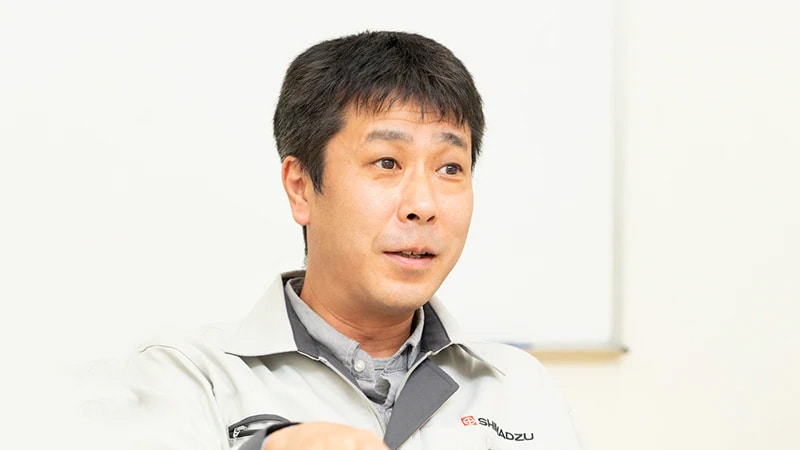
According to Mukaibatake, "We wanted to enter this market as quickly as possible, because it was a large market, but development took more than five years. Customers gave the LCMS-8030 excellent evaluations but several more years, and more advanced systems, were needed to penetrate the market."
Now, the triple quadrupole LCMS-8000 Series is Shimadzu’s main product, the result of tremendous efforts by its technical experts.
After obtaining a certain level of success in the triple quadrupole market, the MS Business Unit proceeded to the development of a Q-TOF mass spectrometer.
"Triple quadrupole and time-of-flight mass spectrometry users account for about 80 % of the total LCMS market. For that reason, only manufacturers that produce both types of systems can be considered fully-fledged mass spectrometer manufacturers. Adding a Q-TOF LCMS to our product lineup was essential." (Mukaibatake)
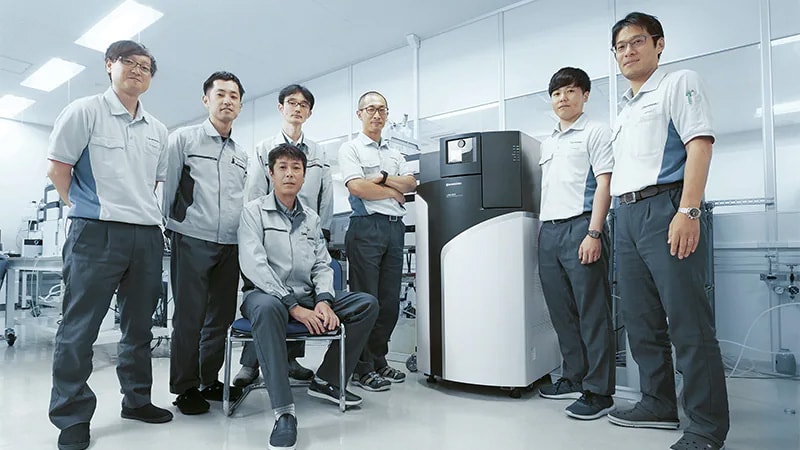
Kazuo Mukaibatake (front), Manager of the LCMS Group, MS Business Unit, Life Science Business Department, Analytical & Measuring Instruments Division, and members of the Analytical & Measuring Instruments Division around the LCMS-9030. In the photograph from the left are: Yohei Ukai, Assistant Manager in the Electronics Group, Research & Development Department; Atsushige Ikeda, Assistant Manager in the Software Group, Research & Development Department; Toru Shiohama, Deputy Manager in the Solution Development Group, MS Business Unit, Life Science Business Department; Yusuke Sakagoshi, Assistant Manager, Analyzer Group, Research & Development Department; Kazuma Maeda, Solution Development Group, MS Business Unit, Life Science Business Department; and Daisuke Okumura, Assistant Manager, LCMS Group, MS Business Unit, Life Science Business Department.
Amazing Technologies
"Next is the time-of-flight system. Would you like to work on it?" In April 2013, this is what Itoi, then General Manager of the Business Unit (current Corporate Officer and Deputy General Manager, Analytical & Measuring Instruments Division), said to Okumura, who led the hardware development section in the development of the LCMS-8030 and 8040.
"At last the time has come." Okumura had conducted research into mass spectrometers while a member of the Physics Faculty in his previous position, and specialized in time-of-flight analyzers. However, since joining the company in 2005, Okumura was primarily involved in quadrupole type instruments. The chance to demonstrate his real capabilities had arrived. No options were overlooked.
As would be expected, there were differences between his work in university research and actual product development. Okumura had focused on the technologies of the electrical systems. In order to accelerate ions, it is necessary to apply voltages of about 10,000 volts. If the voltage fluctuates by only 0.02 volts, the ions do not fly correctly. Absolute accuracy is required from the high-voltage power supply.
"The performance requirements for setting the correct values instantaneously and developing a communication function to handle the large volume of data at high speed are significantly greater with a Q-TOF than with a quadrupole type, and we had great difficulties dealing with this." (Ukai, Electronics Group, Research & Development Department)
"The ions fly through a vacuum flight tube, but if the temperature varies, the time also varies. It is essential to stabilize the temperature, but producing technologies for adjusting the temperature in a vacuum took quite a long time." (Sakagoshi, Analyzer Group, Research & Development Department)
A New Start
The development started in 2014, but delays started to appear in the schedule.
"The technologies handled by each person were really amazing. We combined the electronics, firmware, and software technologies, and we were pleased when we could see ions for an instant. However, problems arose, such as the ion was not stable and the noise could not be eliminated, causing a delay of about two months." (Okumura)
When the delay reached its peak, Mukaibatake, who was involved in the development of other instruments, was appointed as project leader.
"The scheduled release date was June 2016, but because of the continuous problems, we regretfully had to ask for an extension." (Mukaibatake)
Thereafter, problems would occur 3-4 times per year, and each time it took one or two months to solve the issues. The pressure gradually increased and the fatigue in the team members also reached a peak.
In June 2018, all the hard work was finally rewarded. The LCMS-9030 was released in spectacular manner at the 66th ASMS Conference on Mass Spectrometry and Allied Topics held in San Diego.
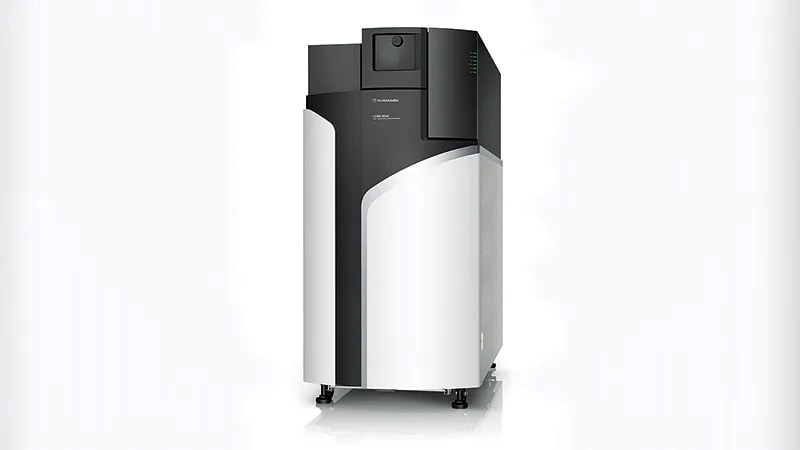
The research-grade LCMS-9030 quadrupole time-of-flight (Q-TOF) mass spectrometer is ideal for use in various fields such as pharmaceuticals, forensics, environment, and food.
With its meticulous design, the instrument was the focus of attention at the conference. Most of all, as a result of the hard work, the stability of the flight of the ions was evaluated and found to be greatly superior to that of other companies' products.
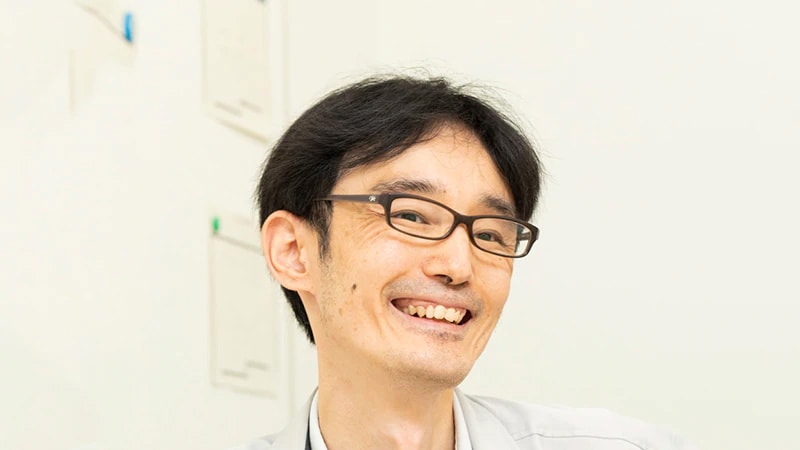
"I was honestly delighted by the evaluations we received. However, after completing the hardware, next came the hard work of the software team. In order to provide an instrument that would be more useful to customers, we listened to their requests, and made improvement after improvement. There is still much to be done." (Shiohama, Solutions Development Group)
The hard work of these professionals is exemplary, and they constantly challenge themselves in order to deliver the best to our customers.
* The information including affiliates and titles of the persons in this article are current as of the time of interviewing.
 Copied
Copied


